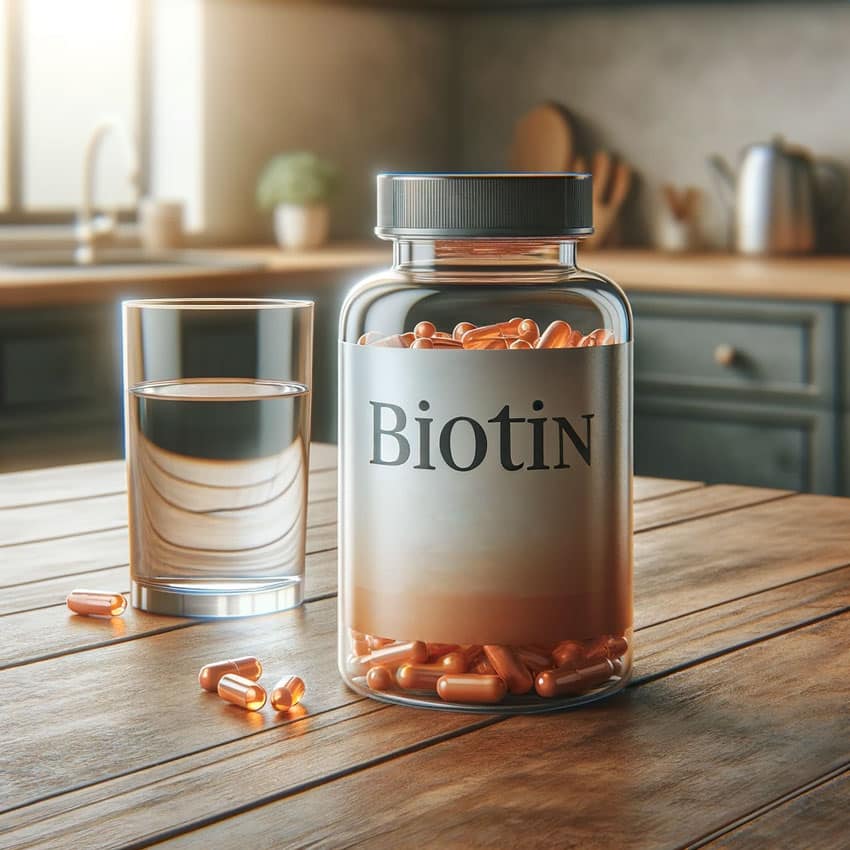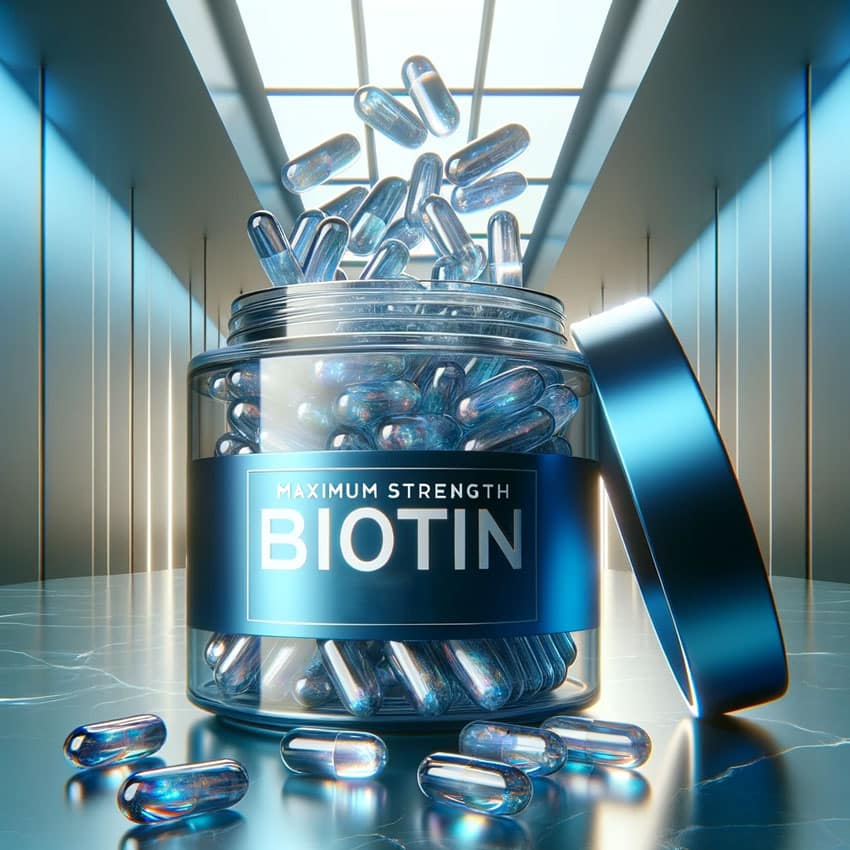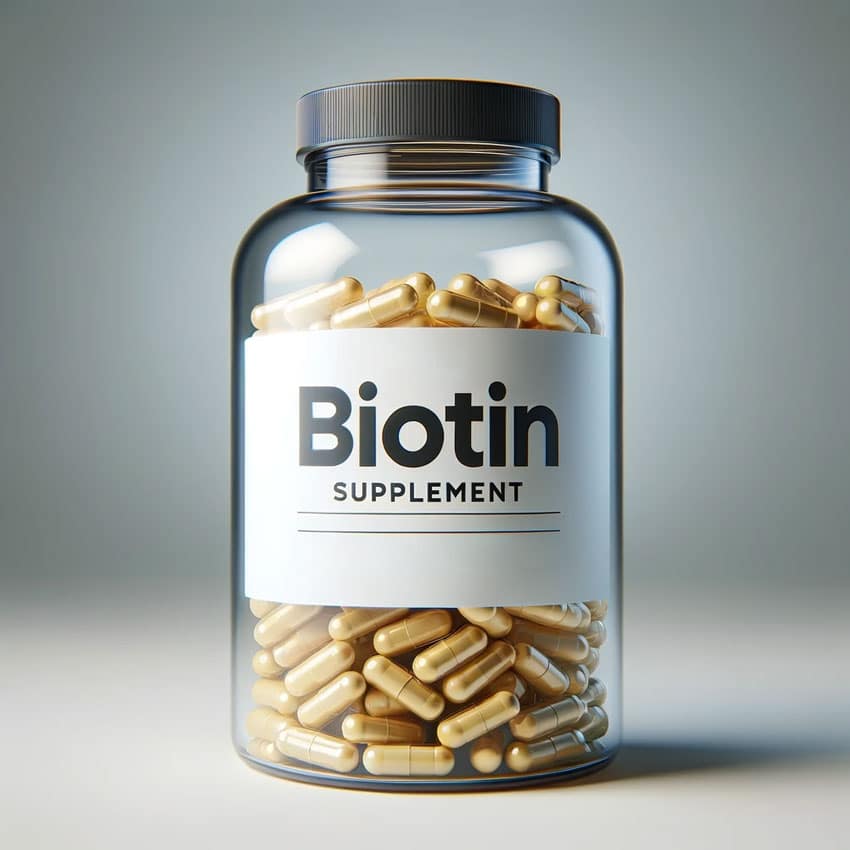Biotin, also known as vitamin B7, is a water-soluble vitamin that is essential for the human body. It is often found in foods such as eggs, nuts, and fish, and is also available as a dietary supplement.
Biotin is known to have many benefits, including promoting healthy hair, skin, and nails. However, there is a growing concern that biotin supplements may cause or worsen acne.
Understanding Biotin and Its Role
Biotin, also known as Vitamin B7, is a water-soluble vitamin that is essential for the body’s metabolism of fats, carbohydrates, and proteins. Biotin is one of the B vitamins and is necessary for the proper functioning of enzymes in the body.
The liver is the primary site of biotin metabolism, where it is converted into its active form, biotinyl-5′-adenylate. This active form is then used by cells to produce proteins and regulate gene expression.
Biotin is involved in many important cellular processes, including the production of fatty acids, the metabolism of amino acids, and the formation of glucose. It also plays a critical role in maintaining healthy skin, hair, and nails.
While biotin is an essential nutrient, excessive intake can lead to adverse effects. One of the most commonly reported adverse effects of biotin is acne. Some studies have suggested that high doses of biotin can stimulate the production of sebum, the oily substance that can clog pores and lead to acne.
Biotin’s Effect on Skin, Hair, and Nails

Biotin, also known as vitamin H, is a B vitamin that plays a crucial role in the health of skin, hair, and nails. It is involved in the production of keratin, a protein that makes up the structure of these tissues.
While biotin deficiency is rare, some people take biotin supplements to improve the health and appearance of their skin, hair, and nails. However, there is limited scientific evidence to support these claims.
Some studies suggest that biotin supplements may improve the strength and thickness of nails, but more research is needed to confirm these findings. Similarly, there is limited evidence to support using biotin supplements for hair loss or thinning hair.
In terms of skin health, biotin deficiency can lead to skin rash and other dermatological issues. However, there is no evidence to suggest that biotin supplements can improve the appearance of skin cells or prevent acne.
It is important to note that biotin supplements can interact with certain medications, including those used to treat seizures and high cholesterol. Therefore, consulting with a healthcare provider before taking biotin supplements is important.

Biotin Supplements and Acne
Biotin is a water-soluble vitamin that is essential for healthy hair, skin, and nails. While biotin supplements have become popular in recent years for their potential benefits to hair growth and nail health, there is some concern that biotin supplements may cause or worsen acne.
According to dermatologists, biotin supplements can cause acne breakouts in some people. This is because biotin supplements can lead to an overproduction of skin cells, which can clog pores and lead to acne.
In addition, biotin supplements can also cause a shortage of vitamin B5, which is important for the health of the skin. A lack of vitamin B5 can result in a lack of moisture in the skin, which can also contribute to acne breakouts.
While biotin supplements can cause acne breakouts, it is important to note that not everyone who takes biotin supplements will experience this side effect. Some people may be more susceptible to acne breakouts due to their individual skin type or other factors.
If you are an adult experiencing acne breakouts after taking biotin supplements, it is important to speak with a dermatologist. A dermatologist can help determine the underlying cause of your acne and recommend an appropriate treatment plan.
In addition to acne breakouts, biotin supplements may also cause other skin-related side effects, such as a rash or blackheads. It is important to be aware of these potential side effects and to speak with a healthcare provider if you experience any concerning symptoms.

Interactions and Side Effects of Biotin
Biotin is a B vitamin that is essential for the body’s metabolism and growth. It is commonly found in foods such as eggs, nuts, and whole grains. Biotin supplements are also available over the counter and are often marketed for their potential benefits in promoting healthy hair, skin, and nails.
While biotin is generally considered safe, it can interact with certain medications and cause side effects in some people.
For example, biotin can interfere with laboratory tests and produce false results. This is because biotin can bind to certain proteins in the blood, which can interfere with the accuracy of some lab tests.
It is important to inform your healthcare provider if you are taking biotin supplements, especially if you are undergoing any medical tests. Your healthcare provider may recommend that you stop taking biotin for a certain period before a lab test to ensure accurate results.
Biotin can also interact with some medications, including anticonvulsants and antibiotics. These interactions can affect the absorption and effectiveness of these medications.
If you are taking any medications, it is important to talk to your healthcare provider before taking biotin supplements.
In terms of side effects, biotin is generally well-tolerated. However, some people may experience mild side effects such as nausea, diarrhea, or skin rash.
In rare cases, high doses of biotin supplements can lead to more severe side effects such as respiratory problems and allergic reactions.
If you have any concerns about taking biotin supplements, it is important to talk to your healthcare provider or a dermatologist. They can help you understand the potential benefits and risks of taking biotin and provide personalized recommendations based on your individual needs and health history.
Dietary Sources and Recommended Intake of Biotin
Biotin is a water-soluble vitamin that is essential for the body’s metabolism and plays a critical role in maintaining healthy skin, hair, and nails. The body cannot produce biotin on its own, so it must be obtained through diet or supplements.
Some of the best dietary sources of biotin include eggs, nuts, seeds, salmon, meat, fish, sweet potatoes, cauliflower, bananas, and cereals. The amount of biotin in these foods can vary, but in general, animal-based foods tend to have higher levels of biotin than plant-based foods.
The recommended dietary allowances (RDAs) for biotin vary depending on age and gender. For adults, the RDA is 30 micrograms per day, while pregnant and breastfeeding women require slightly more at 35 micrograms per day.
The adequate intake (AI) for infants and children varies from 5-25 micrograms per day, depending on age.
While biotin supplements are available, it is usually unnecessary to take them unless there is a specific deficiency or medical condition. In fact, taking high doses of biotin supplements can sometimes cause adverse effects, such as acne or skin rashes.

Conditions Related to Biotin Deficiency
Biotin is a vital nutrient that is required for healthy skin, hair, and nails. A deficiency in biotin can lead to several health problems, including skin conditions like acne. Biotin deficiency is rare, but it can occur due to inadequate intake, genetic disorders, and certain medications.
Deficiency in biotin can lead to a range of symptoms, including skin rash, hair loss, and brittle nails. In severe cases, it can cause seizures, skin infections, depression, lethargy, and hallucinations.
Biotin is essential for healthy skin, and a deficiency can lead to several skin conditions, including acne. Biotin supplements are often recommended for acne treatment, but there is limited evidence to support their effectiveness.
Pantothenic acid, also known as vitamin B5, is another nutrient that is essential for healthy skin and is often recommended for acne treatment. Vitamin A is also crucial for maintaining healthy skin, and its deficiency can lead to several skin problems.
Inflammation is a common cause of acne, and biotin deficiency can contribute to inflammation in the body. Therefore, it is essential to maintain adequate levels of biotin to prevent inflammation and skin conditions like acne.

